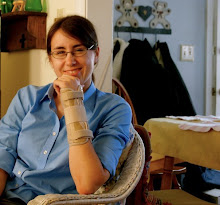Moving
sucks. This is a truth more universally acknowledged than Jane
Austen's opening line about men of a certain stature. But moving also
gives you a chance to evaluate that which is really important to you,
and to find ways to restabilize yourself in a completely new place.
At
least that's been my experience since relocating to Orlando this
month.
After
spending four years of college in the District of Columbia, a city
with which I quickly fell in love, I was forced by my own
inclinations and the quirks of the current job market to relocate
further south-- a big change for this very thoroughly northern girl.
Putting
my possessions into boxes in DC felt a little like packing pieces of
my soul away. This may be a bad thing from a minimalistic
perspective, and I can't deny that I felt throughout the process like
I had way too many possessions. I even got rid of some of them. But I
am a person who strongly favors the presence of order. I don't know
how to be messy. It seems to be in my DNA to make my bed in the
morning, fold my pajamas and put them on the shelf after I shower,
wash the dishes after I eat, and keep a neat desktop. Even if I for
some unusual reason can't make my bed in the morning, I have to do it
before I go to bed at night.
Moving
is an event that severely disrupts this preference (which is probably
why I avoid packing until it's absolutely necessary).
On
the other hand, settling in to my new apartment became an opportunity
to recreate my equilibrium as I unpacked my possessions and found
homes for them.
Unpacking
was a multi-day event here, because it had to be mixed with shopping
for furniture. I haven't personally owned any furniture larger than a
small bookshelf since coming to college-- my desk and bed from high
school and before remain at my parents' house (primarily for
logistical reasons, including the reality of needing a place to sleep
when I do go home). So the majority of the weekend was spent
locating, purchasing, and assembling these new items with my parents.
I
have to say, I vastly prefer moving into a place that's already
furnished, where all I have to do is unpack boxes. It makes life so
much easier.
Still,
over the course of two days, everything important was assembled, and
I was finally able to empty my boxes and settle down. Of that
process, I discovered which of my belongings afforded me the most
peace in my new home.
For
those who know me, the items in the #1 spot will not be surprising.
My books are a tremendous source of joy to me. As a confirmed
bibliophile, a full and well-organized bookshelf has been the
centerpiece of everywhere I have lived since I was old enough to chew
on kiddie literary masterpieces. I don't know if librarians have
their own DNA code, but if they do, I've got it twice over. Books are
my single biggest obstacle in the path to minimalism-- or they will
inevitably have to be the exception. College meant that my pleasure
reading has been curtailed for the past four years, limited to summer
and winter breaks; my summer of “funemployment,” which is now
ended, has reinvigorated my love of the printed word.
So
naturally, I didn't feel entirely right or at all at home from the
time I packed my bookshelf on Tuesday morning to the time I unpacked
and organized them on Friday night.
On
the list of my favorite belongings after that-- and I should note,
at the moment I'm categorizing my “favorite” belongings as the
ones which help me feel most at home in a new place-- is my desk and
desk supplies. As a writer and a thinker, I find that a
well-organized desk correlates with a well-organized mind. So once
again, I didn't feel wholly at ease until my new desk was assembled
and set up.
And
of course, how could my room be my room without some posters and
pictures on the wall? My Casablanca movie poster. The “Keep
Calm and Carry On” poster from my sister. My National Book Festival
poster from last year. Photos of my family that sit on the window
sill wherever I am, and have for four years. And my most recent piece
of art, acquired at someone else's moving sale here in Florida: a
magnificent large landscape painting of mountains and river and pine
trees. This one reminds me of home.
There
are other things here that helped me feel more at home too, but these
three are the big ones, and I think that is because they are what
help me find pleasure and find peace. They engage my creative spirit
and give me a reason to pause in the course of a day or evening and
reflect. They help me to relax and destress at the end of a long day.
What more could you want from inanimate possessions?
My
books alone are enough to ensure that I may never be a true
minimalist. At least right now, I'm okay with that. Simplicity and
minimalism are two different things, and I'm happy just keeping my
life simple right now-- which means focusing on the things that give
me real pleasure, not the ones that distract from the goal of truly
enjoying life to the fullest. And those things are cast into clear,
sharp relief in the hectic days of a moving and the exhausting days
of creating a new home.
